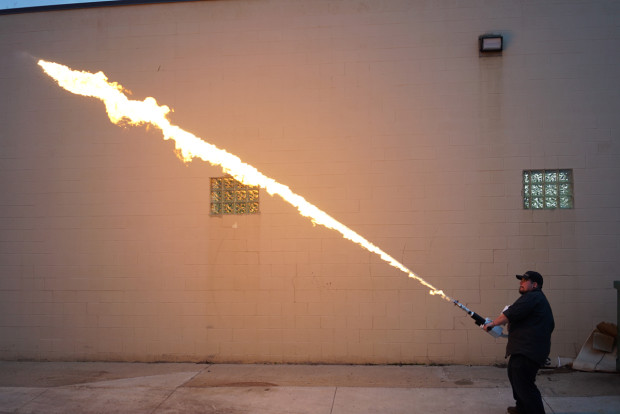
In the wake of two companies now selling the first commercially available flamethrowers in the United States, at least one mayor has called for increased restrictions on their use. And to no one's surprise, the prospect of prohibition has now driven more sales.
"Business is skyrocketing higher than ever due to the discussion on prohibition," Chris Byars, the CEO of the Ion Productions Team based in Troy, Michigan, told Ars by e-mail. "I’m a huge supporter of personal freedom and personal responsibility. Own whatever you like, unless you use it in a manner that is harmful to another or other’s property. We’ve received a large amount of support from police, fire, our customers, and interested parties regarding keeping them legal."
Byars added that the company has sold 350 units at $900 each, including shipping, in recent weeks. That's in addition to the $150,000 the company raised on IndieGoGo.
The Ion product, known as the XM42, can shoot fire over 25 feet and has more than 35 seconds of burn time per tank of fuel. With a full tank of fuel, it weighs just 10 pounds.
Another company—XMatter, based in Cleveland, Ohio—sells a similar device for $1,600 each, but it weighs 50 pounds. However, this device has approximately double the range of the XM42. Quinn Whitehead, the company’s co-founder, did not immediately respond to Ars’ request for comment.
Last week, Mayor Jim Fouts of nearby Warren, Michigan—the third largest city in the state—told Ars that he was worried about the sale of such devices in his city.
"My concern is that flamethrowers in the wrong hands could cause catastrophic damage either to the person who is using it or more likely to the person who is being targeted," he said. "This is a pretty dangerous mix because it's a combination of butane and gasoline which is highly flammable. Anybody who aims this at someone else or something happens and it happens close to them is going to be close to be incinerated."
At the state level, neither State Representative Martin Howrylak nor State Senator Marty Knollenberg immediately responded to Ars’ request for comment.
Totally legal, for now
Shockingly, there are no current federal regulations on the possession, manufacture, sale, or use of flamethrowers.
"These devices are not regulated as they do not qualify as firearms under the National Firearms Act," Corey Ray, a spokesman with the Bureau of Alcohol, Tobacco, and Firearms, told Ars by e-mail.
At the state level, California requires a permit while Maryland outright bans them—Ars is not aware of any other state-level regulation. The Inhumane Weapons Convention, which the United States signed in 1981, forbids "incendiary weapons," including flamethrowers. However, this document is only an agreement between nation-states and their militaries, and it did not foresee individual possession.
A new bill in Troy, Michigan, proposed earlier this month would forbid "storage, use, and possession of flamethrowers in the city." Violations of the law would constitute a misdemeanor punishable by up to 90 days in jail, a $500 fine, or both in addition to seizure of the device.
"Why make/build/sell this? It’s awesome," Byars added. "It’s revolutionary in its design in contrast to previous flamethrowers throughout the years due to its portability and instant-action on the fly functionality. I wanted one, personally, back in 2007, so I began developing plans to create one. Years went by with slow development, and then a spark hit and I decided this was the year to make it happen. I used the resources I gained as an engineer in the auto industry to learn how to make this a reality."
Mayor Fouts remains unconvinced.
"If our own military doesn't use it and it's been banned by the Geneva Convention then why would someone think this should be sold to the general public?" he added. "I think it's too risky to gamble with people's lives. I can't think of something more horrific than to burn somebody alive, and that's what this would do."
reader comments
380